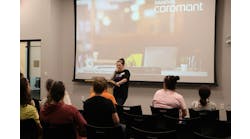For the past 15 years at Fives Cinetic, we have found our solution to the problem of recruiting quality engineers by establishing a comprehensive cooperative education program. We work closely with local and regional universities to identify and interview students enrolled in four-year bachelor's programs in fields including mechanical, electrical, computer and industrial engineering, as well as computer science. Selected students from the University of Michigan, the University of Detroit Mercy and Michigan State University participate in a program that alternates full-time employment with full-time academics, typically for two to four rotations.
For the controls engineering co-ops, each term they are rotated through the various departments of Proposal, Hardware, Software, Robotics, Vision, Service and others. They are assigned mentors who serve as their technical advisors and coaches. Many of these students are offered full-time employment following graduation and completion of the program. Our program now has 25 students each term across the various disciplines.
Students are required to perform real, value-added engineering work. In the first rotation, they are mainly engaged in learning design methods and principles, machinery, and the business processes of the company. By the second or third rotation, the students are fully engaged in the design and commissioning phases of engineering and become a real asset to the team. Many of the students, in turn, consider the experience the most rewarding of their university careers.
Through this program, they not only learn concepts in school, but also apply them to real-world situations. Most notably, the program introduces them to the field of automation; a field that is unfortunately unrepresented in the curricula at most nationwide universities. The glamour of employment at Apple, Google, Microsoft and companies of the like lure many of the best engineers away. But by engaging these top students early in their academic life and providing them a comprehensive and rewarding cooperative experience, we get the opportunity to show them the field of automation. Many then choose to make automation their career choice, and often stay with Fives Cinetic.
The benefits of such a program are clear. It gives us the ability to create our own, homegrown and vetted pool of engineers for employment. The refreshing points of view that they bring to the table give us a definite competitive advantage, especially once they become full-time employees.
Hiring people who simply can step into a position is usually not a reasonable expectation. They require training, on-boarding and, many times, bring with them a possibly negative corporate culture from jobs past. Through this type of a program, we can promote our positive corporate culture early on in their careers while also training them across a broad set of automation skills. After coming onboard full time, the newly minted engineers retain their seniority and are given opportunities for accelerated career growth. All who stay with us will go on to mentor co-op students of their own. Some of our senior management team started their careers as cooperative education students.
Where others have struggled, we have been able to grow our technical advantage in an industry where the constant rapid evolution of controls technology has posed the largest problem. Investing time in a co-op who later chooses to pursue different opportunities after graduation is a risk, but it is well worth the potential reward.




